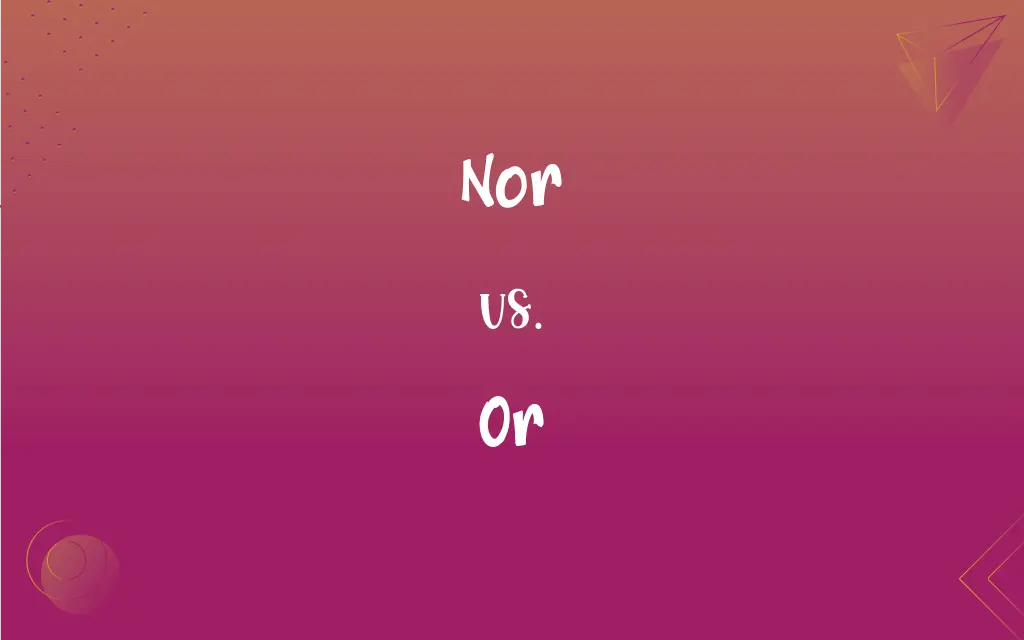Nor vs. Or: What's the Difference?
Edited by Janet White || By Harlon Moss || Updated on October 17, 2023
"Nor" is a negative conjunction used to introduce an alternative negative statement, while "or" presents a positive or neutral alternative.

Key Differences
"Nor" and "or" are both conjunctions used in the English language, but they have distinct functions and usages. "Nor" is specifically used to introduce a negative statement, especially after a preceding negative clause or phrase. "Or", on the other hand, is employed to offer an alternative, which can be either positive, neutral, or even negative, depending on the context.
In terms of usage, "nor" often follows "neither" in a sentence, denoting two negative alternatives. For example, "neither John nor Mary is attending the party." On the contrary, "or" is used to present a choice or alternative, as in "Do you want tea or coffee?" Here, "or" provides two positive options.
Grammatically, "nor" emphasizes the negativity or absence of two or more items or actions, making it essentially an extension of the negativity. "Or", however, doesn't carry an inherent positive or negative connotation. Its interpretation is based on the surrounding context of the sentence.
Another distinction lies in the way sentences are constructed. Using "nor" often requires a more careful structuring to ensure clarity and avoid redundancy. For instance, "He doesn't like apples nor oranges" would be more accurately phrased as "He likes neither apples nor oranges." In contrast, "or" is more straightforward and can be easily placed between two alternatives without much complication.
Lastly, the scope of "or" is broader than "nor". While "nor" is mainly restricted to negative contexts, "or" finds its place in a myriad of situations, including questions, choices, alternatives, and even negative scenarios when paired with "either", as in "either this or that."
ADVERTISEMENT
Comparison Chart
Nature
Negative
Neutral or positive
Common Pairing
Often follows "neither"
Can be used independently
Context
Introduces a negative statement
Offers a choice or alternative
Grammatical Complexity
Requires careful structuring to avoid redundancy
Straightforward usage
Scope
Limited to negative contexts
Broad, including various contexts
ADVERTISEMENT
Nor and Or Definitions
Nor
A word denoting the absence of two or more items or actions.
It's neither helpful nor constructive.
Or
Used to indicate a synonymous word or explanation.
The canine, or dog, is a popular pet.
Nor
Used to continue a negative sentence structure.
He can't sing nor can he dance.
Or
A conjunction used to indicate an alternative or choice.
Would you prefer chocolate or vanilla?
Nor
An alternative conjunction in negative contexts.
You can't force them to listen, nor can you make them understand.
Or
Distinguishes between different possibilities.
Is that your book or mine?
Nor
A negative conjunction used to introduce an additional negative statement.
She neither likes coffee nor tea.
Or
Signifies a possible alternative.
You can take the bus or the train.
Nor
Employed to extend the negativity of a preceding clause.
The movie was not entertaining, nor was it enlightening.
Or
Denotes a consequence or condition.
Study hard, or you'll fail the exam.
Nor
And not; or not; not either
Has neither phoned nor written us.
Life forms that are neither plants nor animals.
Or
Used to indicate an alternative, usually only before the last term of a series
Hot or cold.
This, that, or the other.
Nor
Than.
Or
Used to indicate the second of two alternatives, the first being preceded by either or whether
Your answer is either ingenious or wrong. I didn't know whether to laugh or cry.
FAQs
When is "nor" typically used in a sentence?
"Nor" often follows "neither" to denote two negative alternatives.
Can "nor" be used without "neither"?
While it's common to pair "nor" with "neither", it can be used without it, given careful sentence structuring.
What is the primary function of "nor"?
"Nor" is used to introduce an additional negative statement.
How does "or" function in questions?
"Or" is used to offer choices, as in "Do you want tea or coffee?"
Does "nor" always indicate negativity?
Yes, "nor" is inherently negative and introduces negative statements.
Can "or" denote synonyms?
Yes, it can, as in "The feline, or cat, climbed the tree."
Can "nor" be used to start a sentence?
Yes, but it's less common and often seen in more formal or literary contexts.
Can "or" be used in compound sentences?
Yes, "or" is often used to connect clauses and present alternatives in compound sentences.
Is "or" always exclusive?
Not always. "Or" can be inclusive, meaning both options might apply, or exclusive, where only one option applies.
Can "or" be used in non-choice contexts?
Yes, "or" can be used to indicate consequences, conditions, or synonyms.
How does "or" function in negative contexts?
When paired with "either", "or" can be used in negative scenarios, as in "either this or that."
Is "or" limited to presenting only two alternatives?
No, "or" can introduce multiple alternatives, though clarity might demand breaking them down.
Does "nor" always follow a negative element?
Generally, yes. "Nor" typically extends the negativity of a preceding negative element.
Can "or" be used to indicate consequences?
Yes, as in "Do your homework, or you'll be grounded."
Is "nor" commonly used in everyday speech?
"Nor" is less common in casual speech and is often replaced with simpler structures.
Can "nor" and "or" be used in the same sentence?
Yes, but it's rare and depends on the structure, like "He neither likes tea or coffee."
Is using "nor" without "neither" grammatically correct?
It can be, but requires careful sentence structuring to ensure clarity.
Can "or" be used in both positive and negative contexts?
Yes, "or" can present both positive and negative alternatives, depending on the context.
Is "nor" redundant after "not"?
Typically, yes. It's clearer to use "neither...nor" than "not...nor."
How is "or" used in conditions?
"Or" can indicate a consequence of not meeting a condition, as in "Finish this or face the consequences."
About Author
Written by
Harlon MossHarlon is a seasoned quality moderator and accomplished content writer for Difference Wiki. An alumnus of the prestigious University of California, he earned his degree in Computer Science. Leveraging his academic background, Harlon brings a meticulous and informed perspective to his work, ensuring content accuracy and excellence.
Edited by
Janet WhiteJanet White has been an esteemed writer and blogger for Difference Wiki. Holding a Master's degree in Science and Medical Journalism from the prestigious Boston University, she has consistently demonstrated her expertise and passion for her field. When she's not immersed in her work, Janet relishes her time exercising, delving into a good book, and cherishing moments with friends and family.































































